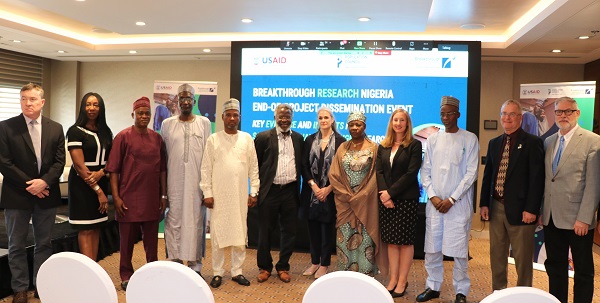
The U.S. Agency for International Development (USAID) has completed its five-year social behaviour change research activity in Nigeria, called Breakthrough Research Nigeria.
The research activity aimed to identify the factors that influence the adoption and practice of health behaviours, which can help inform national and state-level health policies and interventions that seek to increase demand for health services. The programme’s findings will provide a useful framework for policymakers and stakeholders to develop effective health policies and programmes that cater to the needs of the Nigerian population.
USAID’s Breakthrough Research is a global flagship social and behavioural change (SBC) research and evaluation project. Since 2019, Breakthrough Research Nigeria (BR-Nigeria) has made significant contributions to shaping the implementation and adaptation of USAID-funded SBC interventions in the country.
BR-Nigeria implemented a suite of research and evaluation studies using quantitative and qualitative methodologies to respond to SBC questions on programme effectiveness and cost-effectiveness. The studies addressed a range of behaviours such as antenatal care attendance, use of child spacing methods, use of insecticide-treated nets, and infant breastfeeding in Kebbi, Sokoto and Zamfara states.
The studies examined behavioural trends among a consistent sample of approximately 3,000 women with children under the age of two, and their spouses, within wards targeted for SBC program intervention in 2019, 2021 and 2022. The studies found that using an integrated behaviour change approach improved prompt treatment for fever, uptake of malaria tests, and an increase in treatment adherence. Overall, the research found that across study states, women were greatly influenced by men when making choices about seeking care and treatment for their sick children.
USAID’s BR-Nigeria also implemented three other qualitative studies, including a community capacity strengthening study, public sector capacity strengthening study, and advocacy core group assessment study. BR-Nigeria developed more than 30 knowledge products including programme research and policy briefs, peer-reviewed journal articles and publications, blog posts and infographics.
“We are proud that the Breakthrough Research activity generated valuable insights that will continue to influence programmes and investments on newborn and child health, nutrition, family planning, reproductive health and malaria in Nigeria,” said USAID/Nigeria deputy mission director, Sara Werth in her opening remarks.
The research study results will shape the ongoing primary healthcare implementation at the work plan level and shape future SBC research. The programme’s findings will provide a useful framework for policymakers and stakeholders to develop effective health policies and programmes that cater to the needs of the Nigerian population.
The success of the programme highlights the importance of research and evaluation in social and behavioural change interventions. By integrating research and evaluation at every stage of programme implementation, policymakers and stakeholders can develop effective policies and programmes that can improve health outcomes and increase the demand for health services.


